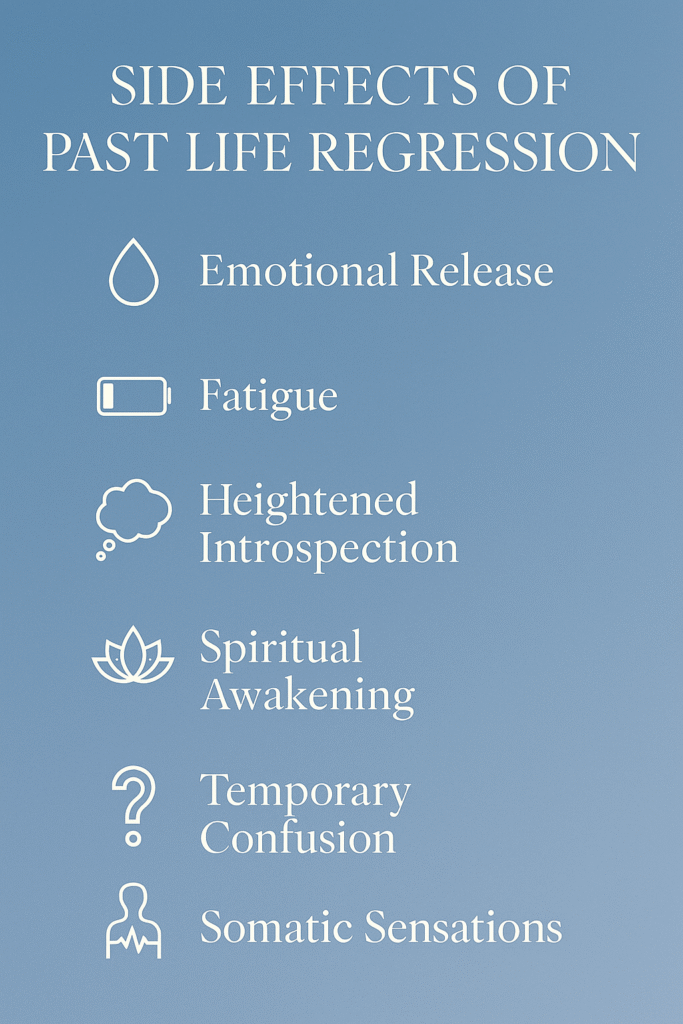A compassionate guide to understanding what may arise after a soul-deep session.
When people hear the term “side effects,” they often assume something negative. But side effects aren’t inherently bad—they’re simply what happens as a natural result of an experience. And when that experience is something as profound and energetically shifting as a past life regression session, it makes sense that your mind, body, and spirit might respond in noticeable ways.
In my work as a certified hypnotist and metaphysical practitioner, I often remind clients that what they feel after a session—emotionally, physically, even spiritually—is completely normal. Whether it’s fatigue, heightened introspection, or an emotional release, these responses are signs that something meaningful has stirred beneath the surface.
Past life regression hypnosis is not entertainment. It’s not just a fascinating look into who you might’ve been. It’s a doorway into healing—guided by Spirit, rooted in intention, and deeply personal. And like any deep healing work, it can take a little time to integrate.
That’s why this article isn’t meant to scare you off—but to help you understand what you might experience after a session. When you’re prepared and supported, even the most intense side effects become part of a beautiful unfolding process.
In the sections ahead, I’ll walk you through the common side effects of past life regression—what they mean, why they happen, and how to support yourself afterward. Most importantly, I’ll help you see these experiences not as setbacks, but as sacred signs that your soul is responding.

Emotional Responses
When the Soul Opens Up
One of the most immediate and noticeable side effects of past life regression is emotional release. This makes sense when you realize the depth of what’s happening—you’re connecting with the subconscious, where soul memories, unresolved feelings, and buried energy live. When that door opens, it’s not uncommon for emotion to flood through.
Intense Emotional Release
Tears, laughter, waves of grief, sudden joy—it can all come rushing forward during or after a session. I’ve seen clients cry without knowing exactly why, or feel an overwhelming peace they haven’t felt in years. Sometimes the emotion is tied to a specific scene in a past life; other times, it’s simply the result of releasing what the body and soul no longer need to hold.
This is all completely normal—and more than that, it’s healing.
In fact, the Gettysburg College study on past life regression emphasizes this emotional catharsis as one of the most consistent and transformative effects. Participants reported experiencing strong emotional reactions that often led to personal insights, clarity, and a renewed sense of self-understanding.
Temporary Emotional Turbulence
For some, especially those who uncover trauma or challenging soul experiences, the emotional aftermath can feel heavy. You might notice mood swings, sadness, or even anxiety in the days that follow. This isn’t a sign that something went wrong—it’s simply your system continuing to process what surfaced.
This is why I always recommend carving out quiet space after your session. Drink plenty of water, get some rest, and let your feelings move through you. This is your soul doing deep, sacred work—and it deserves time and compassion.
Above all, remember: you are not alone. If something doesn’t make sense, or if the emotions feel too big, it’s completely okay to reach out to the practitioner who guided your session. Integration support is part of the journey, and can help bring the experience full circle.
Cognitive and Psychological Effects
Navigating Inner Shifts
After a past life regression session, it’s common to find your thoughts wandering to places they hadn’t before. New insights can create new questions. You may feel a little “off” for a few days—not in a scary way, but in a what-just-happened-and-what-does-it-mean? kind of way. This is your conscious mind trying to catch up to what your subconscious already knows.
Heightened Introspection
Many people become more inward-focused after a session. You may find yourself replaying parts of the experience, questioning your life choices, or reevaluating relationships and patterns. While this can feel overwhelming at times, it’s actually a sign that your system is integrating the wisdom received.
Your conscious mind is processing the energetic and emotional downloads that came through in hypnosis. This might show up as vivid dreams, flashes of imagery, or sudden moments of realization that seem to come out of nowhere. My advice? Be gentle with yourself. Journal. Reflect. Let it unfold without needing to rush into action or draw conclusions right away.
Disorientation or Identity Shifts
Some clients temporarily feel disoriented, especially if the session brought up strong material or shook up long-held beliefs. You might wonder: Was that real? Am I imagining things? What does this say about who I am now?
This is totally natural.
The Gettysburg study pointed out that some individuals, particularly those with strong imaginations or suggestibility, may find themselves questioning their identity or experiencing temporary dissociation. But here’s the key—this doesn’t mean regression is harmful. It just means that deep work needs deep integration.
That’s why working with a grounded, ethical practitioner (and taking the time to reflect post-session) is so important. This is not just about remembering who you were. It’s about reclaiming who you’re becoming.
Remember what I always say: Spirit will never reveal anything you’re not ready for. If something surfaced, it’s because you’re ready to heal it.
Spirit only reveals what you’re ready to see. If it surfaced, it’s because you’re ready to understand it.
— Marcelina Hardy, NBCHt
Memory Distortion and False Memory
Let’s talk about one of the most debated aspects of past life regression—memory. More specifically: Can the memories that come up be false? Can someone be “led” into imagining something that isn’t real?
The short answer: Yes, it’s possible. But with the right guidance, it’s also preventable.
The Power of Suggestion
One of the key findings from the Gettysburg College study was that individuals with high levels of suggestibility are more vulnerable to forming false memories—especially if the regression facilitator isn’t properly trained. This is why it’s so important to work with a certified practitioner who knows how to ask neutral, open-ended questions rather than leading or planting ideas.
In my practice, I always tell clients: I’m not here to give you answers—I’m here to hold the space so your subconscious can show you what’s true for you. That truth might be literal. It might be symbolic. And it might be somewhere in between. But it’s yours. And it’s valuable.
Symbolic vs. Literal Memories
Here’s something I deeply believe: It doesn’t matter whether the memories that come up during a regression are “real” in a historical sense. What matters is the healing that follows.
Sometimes a past life experience is incredibly vivid—names, dates, scenes that feel historically accurate. Other times, it’s more emotional or symbolic: a flood of grief without a clear story, or a vision that feels more like a metaphor than a memory. Either way, what your subconscious reveals is aligned with your intention—and that’s where the magic happens.
So, yes, memory can be fluid. But so is healing. And past life regression isn’t about proving facts—it’s about uncovering insight. If a memory (real or symbolic) helps you shift a belief, heal a wound, or find peace… that’s what truly matters.
Physical Reactions
Your Body Remembers, Too
We often think of past life regression as a mental or emotional experience—but your body is just as much a part of the process. In fact, the body often responds in its own subtle (or not-so-subtle) ways to what’s being released energetically and emotionally.
As strange as it may sound, your physical form can hold the residue of past life trauma, stress, or emotional imprinting. When you access those memories through regression, the body often participates in the release, too.
Fatigue and Energetic Drain
One of the most common physical side effects people report is simply feeling tired. Not just “I need a nap” tired—but emotionally and energetically spent.
This makes sense. Regression requires your subconscious to open up and move through deep material. Add in emotional release, new insights, and a shift in spiritual awareness—and it’s no wonder your system needs rest afterward.
That’s why I always encourage people to drink lots of water, ground themselves, and take the rest of the day (or even the next!) as gently as possible. You’ve just done some powerful inner work. Give yourself space to recover and recalibrate.
Somatic Sensations
Sometimes people experience physical sensations during or after a session—tightness in the chest, a pulsing in the throat, sudden warmth or chills. These are often signs of old energetic patterns moving through and out of the body.
The Gettysburg College study documented similar reports from participants, noting that somatic responses often corresponded with moments of emotional intensity or trauma recall during the session.
These sensations are usually brief and resolve naturally, especially with proper aftercare. But if something feels persistent or confusing, don’t hesitate to reach out to your practitioner. Often, just speaking about what happened helps your system relax and process more fully.
Feeling “Off” in the Body
In the hours or days following a session, you may feel a little off—ungrounded, spacey, or unusually sensitive. Again, this is your body integrating what the soul has just experienced. It’s not a flaw; it’s part of the unfolding.
The best thing you can do is listen to your body. Rest. Nourish. Move gently. Let your physical self catch up with your spiritual one.
Spiritual Effects
Expanding Consciousness
For many people, one of the most beautiful—and sometimes unexpected—side effects of past life regression is a deepened spiritual awareness. Even if you walked into your session unsure about reincarnation or soul journeys, it’s not uncommon to leave feeling… changed. Opened. Connected.
That’s because regression taps into something beyond logic. It reconnects you to a part of yourself that knows. And that knowing doesn’t always come with words—it comes with feeling.
A Sudden Awakening to Soul Truths
After a session, you may feel more in tune with your intuition, more aware of soul connections, or more curious about your life purpose. You might start to see your current life through a wider lens—understanding challenges not as punishment, but as patterns you’re here to grow through.
These shifts can be subtle or dramatic. Some people leave a session with a sense of peace they can’t explain. Others find themselves pulled to spiritual practices, past cultures, or healing modalities they never considered before.
And it makes sense: once you’ve touched the timeless part of your soul, it’s hard to go back to seeing yourself as just a mind and body.
Vulnerability, Openness, and the Role of Trust
Of course, opening up spiritually can feel a little vulnerable. You might question what’s real, what’s imagined, and what it all means. You may feel raw or energetically exposed for a few days as your energy field adjusts to the experience.
This is where trust comes in.
Trust that Spirit will only reveal what you’re ready to see. Trust that your intention is always honored. Trust that this journey is unfolding exactly as it should.
As I often tell my clients: Spirit wants to help you, not harm you. What arises is meant to support your healing, your growth, and your soul’s highest path.
Lean into that trust, and you’ll move through the experience with greater grace—and a deeper connection to your own inner wisdom.
Post-Session Integration
Supporting the Unfolding
What happens after a past life regression session is just as important as what happens during it. You’ve opened a door to your subconscious and soul wisdom—and now your mind, body, and spirit need time to process what was revealed.
Think of it like planting seeds. Some insights may bloom immediately. Others will grow slowly over the coming days and weeks. That’s why post-session care is essential—not only to soothe any side effects but to help the healing fully take root.
Grounding and Self-Care
After your session, take it slow. Drink plenty of water. Rest. Avoid intense emotional conversations or overstimulating environments if possible. You’ve just done something big—and you deserve to recover in peace.
Journaling is one of the best tools for integration. Write about what you saw, what you felt, what questions remain. You don’t have to “figure it all out”—just give your subconscious space to keep speaking.
Gentle movement (like walking or stretching), time in nature, or grounding meditations can also help bring your energy back into balance.
And most importantly: be kind to yourself. Healing doesn’t have to be rushed or understood all at once. Trust that what surfaced is already working within you.
Reaching Out for Continued Support
If you feel confused, unsettled, or just want to talk through what came up, reach out. A responsible regression practitioner will always welcome your questions and offer guidance on next steps. Read my guide on what questions to ask in a past life regression if you’re curious as to what questions might come up after your experience.
As I often say to my clients: It’s never an issue to reach out to the person who guided your session. When we process it together, it often brings the experience full circle.
Integration is part of the healing. You’re not meant to do it alone.
Trust the Process, Trust Spirit
Sometimes the effects of a session are immediate. Sometimes they ripple out for weeks. Either way, trust that Spirit has shown you exactly what you needed to see in the moment. Nothing more, nothing less.
You may not understand the full meaning right away—and that’s okay. Clarity will come. What matters most is your willingness to receive, reflect, and move forward with intention.
Tarot Break ~ Click the Card for a Tarot Reading
Before clicking the card, ask Spirit what message do you need right now. You can then Start Chat to ask a question about the reading. An AI-Chatbot will respond based on the card.

Let the Healing Unfold
Side effects of past life regression aren’t something to fear—they’re something to understand. They’re simply your system’s natural response to an experience that moved you deeply. Whether it’s fatigue, emotional release, spiritual shifts, or introspection, it’s all part of the healing process.
This work isn’t surface-level. It touches the soul. And when you access wisdom that’s been stored across lifetimes—or even just across years—you create space for profound transformation.
Some side effects may be immediate and obvious. Others may feel subtle or strange. But if you approach them with openness, self-compassion, and support, they become part of a beautiful unfolding—one that leads to greater clarity, peace, and alignment with who you’re truly meant to be.
Just remember:
- Drink water.
- Give yourself rest.
- Reflect without pressure.
- Reach out if you need support.
- And most of all, trust that Spirit only ever reveals what serves your growth.
You’re not broken. You’re awakening. And everything you feel in the days after your session is your soul’s way of integrating a new layer of truth.
If you’re considering scheduling your first session and want to understand what you’re paying for—and what kind of support you’ll receive—you might find this helpful: Past Life Regression Cost
Frequently Asked Questions
Is it normal to feel tired after a past life regression session?
Yes, very normal. Fatigue is one of the most common side effects. Your body, mind, and spirit are processing a lot—even if it didn’t feel intense in the moment. Think of it as your energy field adjusting to new awareness.
What if I feel emotional days after my session?
That’s actually a good sign—it means the work is still unfolding. Emotions surfacing afterward are part of your subconscious integrating what was revealed. Be gentle with yourself. Journal, rest, and let the healing continue.
Can I talk to my practitioner after the session?
Absolutely. I always encourage it. Sometimes the full meaning of your experience doesn’t click until a day or two later. Reaching out helps bring clarity, closure, and deeper integration.
What if I didn’t see anything during my session?
It’s okay. You don’t have to “see” past lives for healing to occur. Sometimes the messages come through as feelings, symbols, or even silence—Spirit reveals what you’re ready for, in the form you’re most able to receive.
Are the side effects dangerous?
Not at all. They can be intense at times, but they’re not harmful. They’re simply your system responding to energetic and emotional shifts. With proper grounding, rest, and support, they usually pass within a day or two.
Curious to explore even more about past life regression?
Read the full Past Life Regression Hypnosis Guide for everything you need to know—from how it works to what to expect in your first session whether in person or online.
Or, if you’re ready to experience it yourself, book a session with Marcelina Hardy, NBCHt and begin your journey inward.




